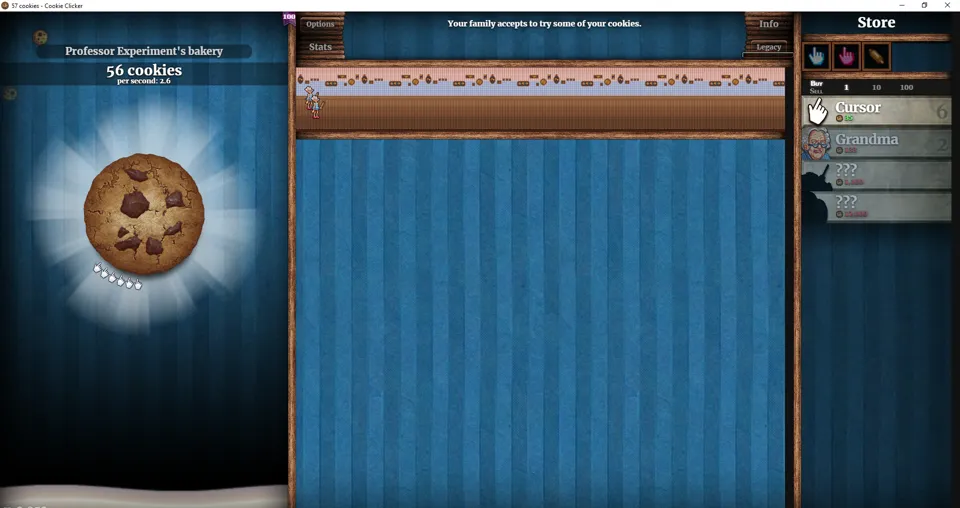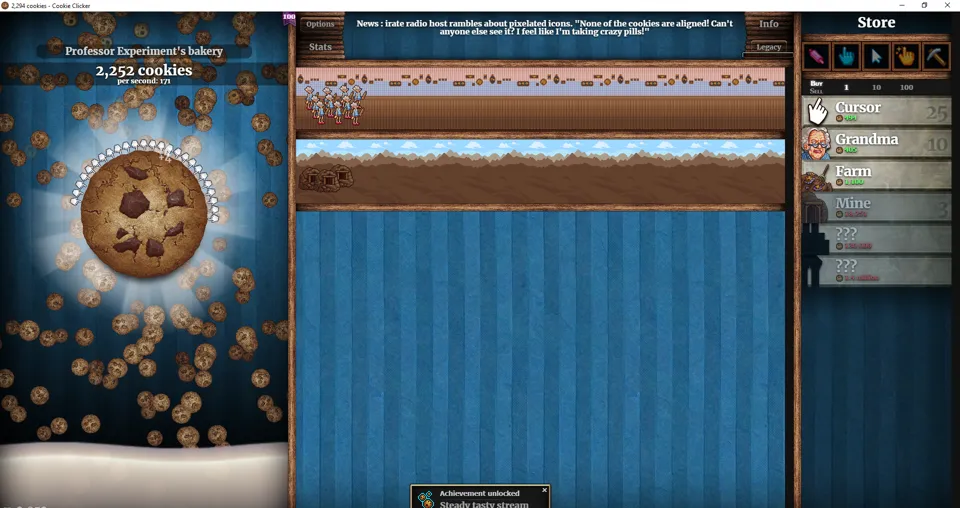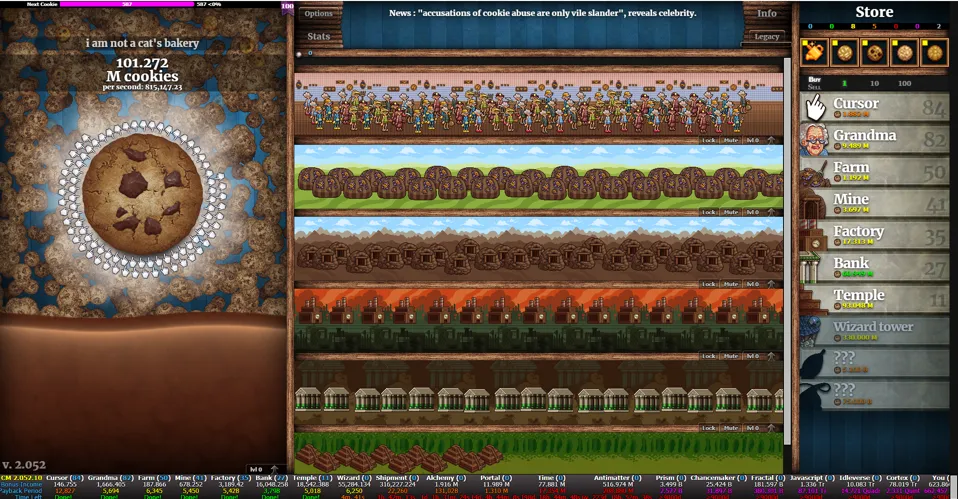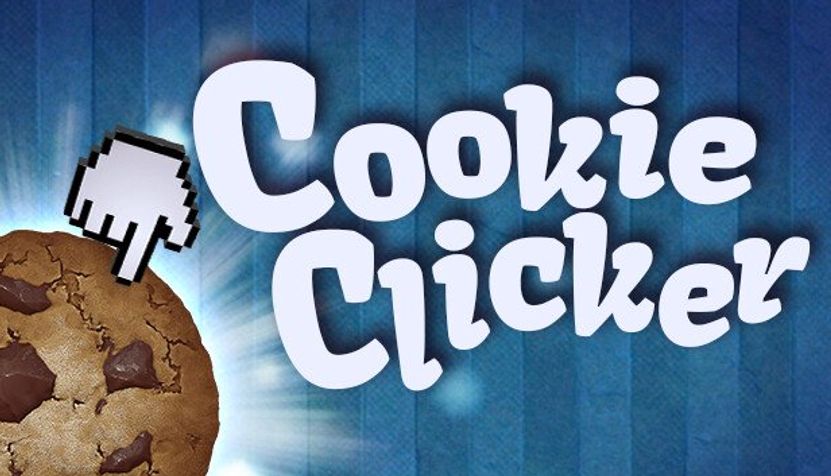Cookie Clicker
I’ll be blunt. Cookie Clicker is a game that revolutionised an entire genre, and indeed, our conception of gaming as a whole. It called into question the role of human agency in games, and what we actually need or expect a game to do. This game has a full decade of development, commentary on that development, and libraries of discourse around what it is, what it represents, and what it says about who we are. What can be said about Cookie Clicker has been said about Cookie Clicker.
And yet, here I am, adding to the discourse. Why? Do I think I have something new to add, some new revelation or way of looking at Cookie Clicker that no one else has seen?
Commentating on Cookie Clicker feels almost as sisyphean as Cookie Clicker itself, and yet, here I am, pushing this boulder, adding to that library, perhaps for no one’s benefit but my own.
 /click
/click
Cookie Clicker is an idle game. Indeed, in many ways, it is the idle game, having changed the genre from one where the algorithmic nature of the game was a quiet background hum the game hoped the player wouldn’t notice to one where the algorithmic nature is the point. In Cookie Clicker, the player runs a bakery. There is no goal except to bake cookies. This is initially done by clicking a large cookie; however, the player can purchase upgrades that automatically generate cookies, thus removing the need for the player to do anything but occasionally check in on the bakery and purchase more upgrades with the accumulated cookies. I, for example, have the game running in the background while I’m writing this review, and I pop in every once in a while to buy something, before trying to refocus on what I’m writing here.
Still, even though the game can be played entirely idly, it does still offer reasons to keep checking in on it. Lucky cookies, for instance, spawn every few minutes, and manually clicking on them provides a large boost to cookie production. There is also a cathartic joy in watching the number of cookies tick higher and higher, and closer and closer to whatever it is the player is trying to purchase. Though the player doesn’t have to look at the game at any point once they’ve truly automated, there are incentives to do so, both in gameplay and in raw emotional satisfaction. The game builds an emotional connection with the player, through no intention of its own. It triggers something deep in the brain that urges the player to come back, click, or if not click, just watch numbers go brrr.
 /click
/click
The true genius of Cookie Clicker, though, is that somehow, impossibly, it has a narrative. The player’s bakery - my bakery, I’ll call it what it is - goes from a single person, clicking a cookie and hiring a reasonable amount of help to grow and become more efficient, to a larger and larger behemoth that begins to rewrite and warp the rules of reality itself. Rather than just hiring grandmas, I began to mine cookies, to replace the world economy with cookies, to draw cookies from other dimensions, to call upon the ethereal planes to transform everything into an engine dedicated solely to the production of my cookies. The world, this reality, everything in it, become mine, to do with as I please, as long as what I please is the production of cookies. All things become cookies, because all things have always been cookies, and all the world ever needed was someone like me to point out this inalterable truth. History becomes recontextualised, acts lose their meaning in service to the reality that is the cookie.
So it’s about capitalism, really.
 /click
/click
We enter the game. This is our first mistake, but not really one of our own choosing. We do not choose the society we are born into, nor do we have much agency to change the society in which the rest of our lives play out. Sure, there are elements that we can believe we change. We might choose to move to a different country, or engage to a greater or lesser degree, but the system in which we exist is inescapable.
Our engagement with it starts slowly, softly, innocently. We spend little, understand very little of the consequences of our actions, and our own individual actions have few consequences. We have no real agency over our lives, only over the small corner that is our own minds and perhaps our own space.
We grow. Our ability to shape the world around us grows alongside us, as does our impact. We have the ability to make choices of our own, and in so doing, butt into the worlds of others, shaping them, warping them, creating of them something that reflects back on us. We consume more. We are encouraged to consume more. Our worth is judged by our consumption, and our potential by that future potential to consume.
We grow further. Knowledge, identity, the things that bring us joy, all of this becomes fuel for endless growth and consumption. The time spent on hobbies should be monetised. Education is quantified with an ROI. Partners should supplement our own net worth. The data about us becomes more valuable than the organs within us, as the data can be used to drive us to consume. We are fed into a machine, and the machine feeds a new, algorithmic identity back to us. Everything we are, everything we ever hoped to be, and everything we never could have been is driven into the machine. Our very humanity is defined solely by its ability to consume.
Our consumption has consequences. I know this. You know this. Everyone, in their heart of hearts, knows this. There is no ethical consumption under capitalism, but have you considered why? Capitalism is a system that requires exploitation to survive. There must always been an underclass, always be someone less able to consume, so that they and their labour can be the fuel for others’ consumption. Every product requires resources, every shipment is more fossil fuels, every kilowatt hour another nail driven deeper into the coffin. The cost of capitalism and the need to grow is our ability to not only live, but survive. Our reality, our view on reality, everything we are becomes warped in service of the need to grow.
I click the cookie. I optimise. I calculate. I click again. I know this is a trap. I know as long as that little cookie sits on my toolbar, my eyes will drift to it. I will work on something else, waiting with bated breath for the next lucky cookie, satisfying that craving when it finally appears, only to long for the next hit.
This is what I was born into when I loaded up the game. This was my first mistake, but not really one I could have known. We do not choose what we are born into, nor do we have the agency to change it. I might believe I have some agency. I can choose the rate of growth and whether to follow what the algorithm tells me, but the outcome is always the same. Reality becomes warped, and I along with it.
I click.
Developer: Orteil
Genre: Idle
Year: 2021
Country: France
Language: English
Play Time: /Click
Youtube:
